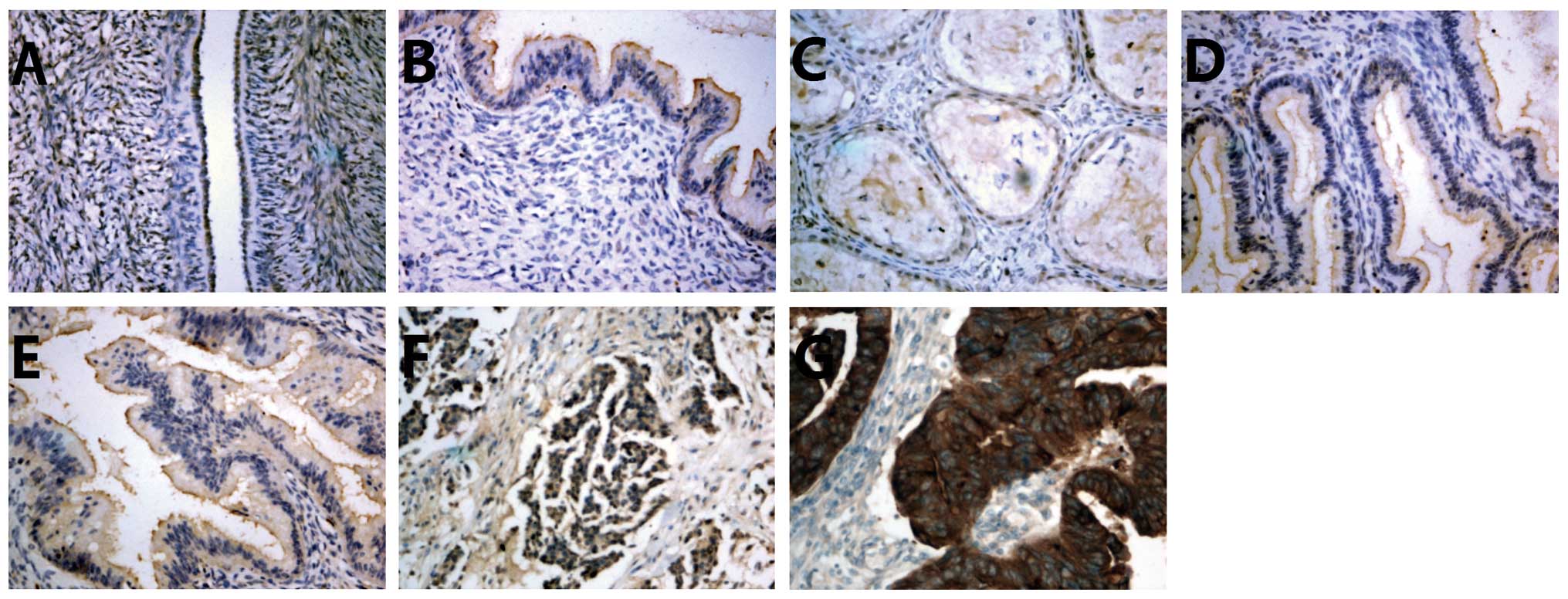|
1
|
Jemal A, Siegel R, Xu J and Ward E: Cancer
statistics, 2010. CA Cancer J Clin. 60:277–300. 2010. View Article : Google Scholar : PubMed/NCBI
|
|
2
|
Parkin DM, Bray F, Ferlay J and Pisani P:
Global cancer statistics 2002. CA Cancer J Clin. 55:74–108. 2005.
View Article : Google Scholar : PubMed/NCBI
|
|
3
|
Gu M and Shi W: Current Research
Management of Ovarian Cancer in China. The Chinese German Journal
of Clinical Oncology. 4:212–218. 2002.
|
|
4
|
Shen K: The progress and challenge of
chemotherapy in ovarian cancer. Chin J Clin Obstet Gynecol.
2002:3–7. 2002.
|
|
5
|
Qiu J, Huang P, Liu Q, et al:
Identification of MACC1 as a novel prognostic marker in
hepatocellular carcinoma. J Transl Med. 9:1662011. View Article : Google Scholar : PubMed/NCBI
|
|
6
|
Ponzo MG, Lesurf R, Petkiewicz S, et al:
Met induces mammary tumors with diverse histologies and is
associated with poor outcome and human basal breast cancer. Proc
Natl Acad Sci USA. 106:12903–12908. 2009. View Article : Google Scholar : PubMed/NCBI
|
|
7
|
Cappuzzo F, Marchetti A, Skokan M, et al:
Increased MET gene copy number negatively affects survival of
surgically resected non-small-cell lung cancer patients. J Clin
Oncol. 27:1667–1674. 2009. View Article : Google Scholar : PubMed/NCBI
|
|
8
|
Stein U, Dahlmann M and Walther W:
MACC1-more than metastasis? Facts and predictions about a novel
gene. J Mol Med (Berl). 88:11–18. 2010. View Article : Google Scholar : PubMed/NCBI
|
|
9
|
Regauer S and Reich O: CK17 and p16
expression patterns distinguish (atypical) immature squamous
metaplasia from high-grade cervical intraepithelial neoplasia
(CINIII). Histopathology. 50:629–635. 2007. View Article : Google Scholar : PubMed/NCBI
|
|
10
|
Boardman LA: Overexpression of MACC1 leads
to downstream activation of HGF/MET and potentiates metastasis and
recurrence of colorectal cancer. Genome Med. 1:362009. View Article : Google Scholar : PubMed/NCBI
|
|
11
|
Liang P and Pardee AB: Differential
display of eukaryotic messenger RNA by means of the polymerase
chain reaction. Science. 257:967–971. 1992. View Article : Google Scholar : PubMed/NCBI
|
|
12
|
Stein U, Walther W, Arlt F, et al: MACC1,
a newly identified key regulator of HGF-MET signaling, predicts
colon cancer metastasis. Nat Med. 15:59–67. 2009. View Article : Google Scholar : PubMed/NCBI
|
|
13
|
Chundong G, Uramoto H, Onitsuka T, et al:
Molecular diagnosis of MACC1 status in lung adenocarcinoma by
immunohistochemical analysis. Anticancer Res. 31:1141–1145.
2011.PubMed/NCBI
|
|
14
|
Stein U, Smith J, Walther W and Arlt F: M
ACC 1 controls Met – what a difference an Sp1 site makes. Cell
Cycle. 8:2467–2469. 2009. View Article : Google Scholar : PubMed/NCBI
|
|
15
|
Birchmeier C, Birchmeier W, Gherardi E and
Vande Woude GF: Met, metastasis, motility and more. Nat Rev Mol
Cell Biol. 4:915–925. 2003. View
Article : Google Scholar : PubMed/NCBI
|
|
16
|
Arlt F and Stein U: Colon cancer
metastasis: MACC 1 and Met as metastatic pacemakers. Int J Biochem
Cell Biol. 41:2356–2359. 2009. View Article : Google Scholar : PubMed/NCBI
|
|
17
|
Chirgwin JM, Przybyla AE, MacDonald RJ and
Rutter WJ: Isolation of biologically active ribonucleic acid from
sourses enriched in ribonuclease. Biochemistry. 18:5294–5299. 1979.
View Article : Google Scholar : PubMed/NCBI
|
|
18
|
Ferracini R, Di Renzo MF, Scotlandi K, et
al: The Met/HGF receptor is over-expressed in human osteosarcomas
and is activated by either a paracrine or an autocrine circuit.
Oncogene. 10:739–749. 1995.PubMed/NCBI
|
|
19
|
Schmittgen TD and Livak KJ: Analyzing
real-time PCR data by the comparative C(T) method. Nat Protoc.
3:1101–1108. 2008. View Article : Google Scholar : PubMed/NCBI
|
|
20
|
Huntsman D, Resau JH, Klineberg E and
Auersperg N: Comparison of c-met expression in epithelial ovarian
tumors and normal epithelial of the female reproductive extract by
quantitative laser scan microscopy. Am J Pathol. 155:343–348. 1999.
View Article : Google Scholar : PubMed/NCBI
|
|
21
|
Maggiora P, Lorenzato A, Fracchioli S, et
al: The RON and MET oncogenes are co-expressed in human ovarian car
cinemas and cooperate in activating invasiveness. Exp Cell Res.
288:382–389. 2003. View Article : Google Scholar : PubMed/NCBI
|
|
22
|
Sattler M and Salgia R: c-Met and
hepatocyte growth factor: potential as novel targets in cancer
therapy. Curr Oncol Rep. 9:102–108. 2007. View Article : Google Scholar : PubMed/NCBI
|
|
23
|
Bottaro DP, Rubin JS, Faletto DL, et al:
Identification of the hepatocyte growth factor receptor as the
c-met proto-oncogene product. Science. 251:802–804. 1991.
View Article : Google Scholar : PubMed/NCBI
|
|
24
|
Chmielowiec J, Borowiak M, Morkel M, et
al: c-Met is essential for wound healing in the skin. J Cell Biol.
177:151–162. 2007. View Article : Google Scholar : PubMed/NCBI
|
|
25
|
Kaposi-Novak P, Lee JS, Gòmez-Quiroz L, et
al: Met-regulated expression signature defines a subset of human
hepatocellular carcinomas with poor prognosis and aggressive
phenotype. J Clin Invest. 116:1582–1595. 2006. View Article : Google Scholar : PubMed/NCBI
|
|
26
|
Shirahata A, Sakata M, Kitamura Y, et al:
MACC 1 as a marker for peritoneal-disseminated gastric carcinoma.
Anticancer Res. 30:3441–3444. 2010.PubMed/NCBI
|
|
27
|
Shirahata A, Fan W, Sakuraba K, et al:
MACC 1 as a marker for vascular invasive hepatocellular carcinoma.
Anticancer Res. 31:777–780. 2011.PubMed/NCBI
|

















